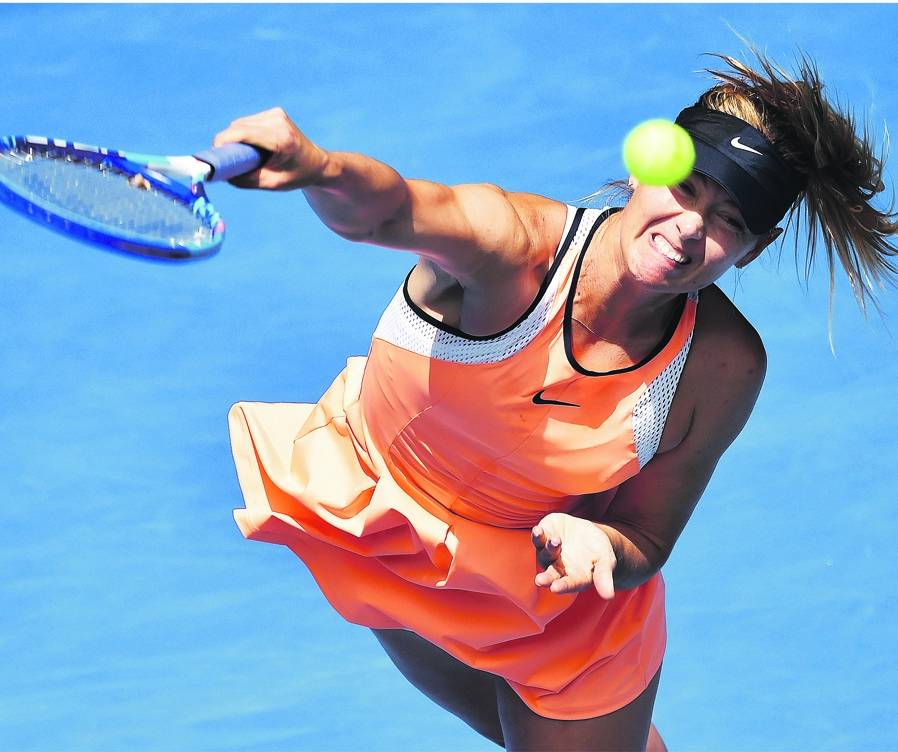
Former champion is unruffled about how she will be received on her return.
The big question that tennis followers across the globe might be asking themselves is: What does the return of five-time Grand Slam champion Maria Sharapova mean?
The former world number one will make her official return to tennis on April 26 after a doping suspension. She was granted a wild card entry to the Stuttgart Porsche Tennis Grand Prix, which starts on April 24.
The 29-year-old, who has not played a competitive match since the Australian Open in January last year, is due to play on the day her 15-month ban ends.
The Russian was initially banned for two years by the International Tennis Federation after testing positive for the banned substance meldonium, a sanction that was originally due to run until January 25 next year.
In October, the Court of Arbitration for Sport reduced her sentence by nine months, saying she bore “no significant fault or negligence”.
With her return, it is most likely that some players will feel she has been favoured because of her celebrity status. But Women’s Tennis Association (WTA) chief executive officer Steve Simon said: “I believe that the game, the fans, the tour ... everybody is going to welcome Maria back.”
During the WTA finals in Singapore last year, he told CNN’s Open Court host Pat Cash: “Maria owned up to everything she did. We wish all athletes and people would own up to what they do and take responsibility for their actions.
“She did. She has gone through the process. She received no special consideration due to her celebrity status.”
Simon recounted what the ban had done to Sharapova’s career.
“She has paid a hefty fine. She has lost her ranking and has lost 15 months of income.”
Shortly after Sharapova admitted to the failed drug test, last year’s WTA champion, Dominika Cibulková, labelled her “unlikeable, arrogant, conceited and cold”.
Doubles Grand Slam winner Kristina Mladenovic claimed that Sharapova “was not really nice nor polite”.
Sports scientist Professor Ross Tucker told City Press that Sharapova should have finished her two-year ban.
“I would have preferred for her to stay [suspended] longer and finish her ban,” he said.
“The best case you can make for Sharapova is that she was grossly negligent. That she, along with her many advisers, failed to take heed of not one, but multiple alerts, that meldonium was to be added to the banned list last year.
“Anti-doping officials should be harder on that, but, with a good lawyer, it does undermine the process,” Tucker said.
Historically, tennis stars have had their doping bans cut short after taking their cases to the Court of Arbitration for Sport.
Croatia’s Marin Cilic was given a nine-month ban in 2013, which was later reduced to four months, and Serbia’s Viktor Troicki was sidelined for 18 months, a sentence that was reduced to 12 months on appeal by the court.
Sharapova, who was the highest earning female athlete in the world for 11 years in a row – according to Forbes magazine – has been keeping herself active during her 15-month ban.
She took a class in global strategic management at Harvard Business School; spent 10 days in London studying leadership; interned at an advertising agency; spent a week shadowing National Basketball Association commissioner Adam Silver; and spent a week with Nike designers so that she could attend to her gummy sweet brand, Sugarpova.
“I learnt that life can be okay without tennis,” said Sharapova, who has also just finished writing an autobiography, which is scheduled to be published in September.
Last month, Sharapova told the ANA Inspiring Women in Sports Conference in Mission Hills, California, that her time off “was empowering”.
However, she is eager to get back to the courts.
“I’ve been training quite hard for the past four months,” she said. “[But] practice is never the same as match play.”
Sharapova said she was not worried about the reception she would receive because she believed her integrity was intact.
The 2008 Australian Open winner may not be given a wild card for the French Open which takes place from May 28 to June 11, a competition she has won twice.
French Tennis Federation president Bernard Giudicelli told sports channel ESPN: “Integrity is one of our strong points. We cannot decide, on the one hand, to increase the amount of funds we dedicate to the anti-doping battle and, on the other hand, invite her.”




 Publications
Publications
 Partners
Partners























